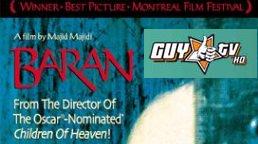
Review: Filmed before the tragic events of September 11, and yet as timely as today's headlines, this Iranian film captures the plight of Afghan refuges in Teheran. There are more than 1.4 million of them who fled the Russian invasion in 1979. Many have grown up never seeing their homeland and, like illegal aliens everywhere, work the hardest for the lowest pay. And yet, this is a love story.
The scene is a skeletal construction site where workers are putting bricks in the frame of a large building. Shot from a distance, the people look like worker bees. But they soon become individuals as the director moves the camera towards them. Work is hard, dusty, backbreaking and dangerous. And there are both Iranians and illegal Afghans working there. The owner, played by Mohammad Amir Naji, is always screaming "get back to work" but we soon find out that his bark is worse than his bite. He's under pressure to get the job done right or he won't be paid, and he also has a warm place in his heart for the hard-working Afghans who must run and hide whenever the inspectors come around.
Lateef, played by Hossein Abedini, is a 17-year old Turkish Iranian and so therefore has a precious identity card. His job is the cook and "tea boy" on the site. He's full of ego and loves to joke around, often getting into arguments and scuffles. One day, one of the Iranian workers gets injured and, in order to feed his family, sends Rahmat, in his place. Rahmat is small and delicate and cannot carry the heavy bags of cement and so therefore is assigned Lateef's job. Lateef is at first furious and is especially angry when Rahmat's cooking is praised by all the workers. Later events make him change his attitude though.
It is interesting that throughout the entire film, Rahmat doesn't speak one single word. However, the audience doesn't miss anything as every possible emotion comes through with just expressions and gestures. The story is a rich emotional experience against a background of harsh reality. The cinematography and direction are excellent. I could feel the strain of muscles doing heavy work. I saw the beauty of the natural countryside, and felt the horror of never having an identity card. I shuddered at the image of a cold stream, which would be beautiful except that women laborers, cold and overworked, were eking out a living by moving boulders. This is the story of extreme struggle. And yet, it is the love story that shines through. --This text refers to an out of print or unavailable edition of this title

